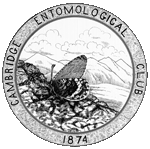
| January 2008: Psyche has a new publisher, Hindawi Publishing, and is accepting submissions |
Article beginning on page 182.
Psyche 6:182, 1891.
Full text (searchable PDF)
Durable link: http://psyche.entclub.org/6/6-182.html
The following unprocessed text is extracted from the PDF file, and is likely to be both incomplete and full of errors. Please consult the PDF file for the complete article.
182 P6-2Tfll%. [November 1891
however, any cessation of its song.
The in-
sects composing the audience are extremely active; and so wary that they take flight at the least alarm on the too near approach of any intruder.
Some of then], however, have
been captured; and on examination these
'proved to belong to the same family as that most beautiful of British insects-the lace- wing fly, which, indeed, they closely resem- ble except as to size, their measurement across the expanded wings being a little over two inches; they have since been identified by Mr. Kirby at the British Museum as
Nothochrysa gigantea."-Nature.
PROCEEDINGS OF SOCIETIES.
CAMBRIDGE ~~NTOMOLOGICAL CLUB.
10 ~ctober, 1890.-The 155th meeting of
the Club was held at 156 Brattle St. Mr. S. H. Scudder was chosen chairman.
The meeting was devoted almost entirely
to informal remarks. Among other topics
Mr. S H. Scudder discussed further damage by white ants in New England. Referring
to remarks made by him at a previous meet- ing on the injuries to geranium cuttings in the forcing houses attached to Mt. Auburn cemetery, and to an article in the Canadian entomologist, by Dr. H. A. Hagen, on their abundance in Cambridge, .he proceeded to describe the injuries done by Termesflavifes to tree ferns growing in tubs at the ~otanic Garden in Cambridge, as well as to the tubs themselves. This had been pointed out to him by Mr. F. A. @inn and Mr. Cameron
of the Botanic Garden. He suggested the
practicability of using staves for the tubs made of galvanized iron, or some such ma- terial, in place of wooden ones. (See Psy- che, 1891, v. 6, p. 15.)
Mr. Scudder also called attention to the issue of a work on the genus Ornithoptera by Robt. H. F. Rippon.
Mr. J. H. Emerton exhibited a few sketches of A. polyfhemus in process of expansion. 12 DECEMBER, 1890.-The 158th meeting of
the Club was held at 156 Brattle St. Mr. Mr. Henshaw read a letter from Mr. Mann
in relation to vol. 4 of Psyche, action on which was necessarily postponed on account of the absence of a quorum.
Mr. S. H. Scudder read the first of a series of letters from Dr. T. W. Harris to Mr. Thos. Say, and the latter's reply. These letters will be published later in Psyche (See v. 6, PP. 57-60).
g JANUARY, 1891.-The 159th regular meet- ing and 15th annual meeting (since incorpo- ration) was held at 156 Brattle St. Mr. S. H. Scudder was elected chairman.
Theannual reports of the secretary and of the retiring librarian were accepted and ordered to be placed on file.
The annual report of the treasurer was pre- sented and referred to the auditors.
Owing to the absence of a quorum the reg- ular election of officers was postponed. Mr. S. H. Scudder then read the annual
address of retiring President Woodwoi-th. The address was entitled "On the relations between scientific and economic entomol- ogy," and will be published in full in Pysche (See v. 6, pp. 19-21).
Mr. Scudder stated that by request of Mr. F. Bolles he had recently examined the con- tents of the stomach of three golden winged woodpeckers (CoZu$tes auratus) which he
found to consist almost entirely of the re- mains of ants of several species. Consider- able discussion followed with regard to the insect food of several other birds, notably the English sparrow (Passer domesticus) and
also the kingfisher (Cede aZcyon) and
kildeer and golden plovers. It seemed to be the general opinion that insects eaten by birds would be better preserved, owing to the chitine in their composition, than seeds, berries, and other more soluble material, so that when a bird had eaten any insects, un- less it was shot immediately after its meal, the insect remains would appear in excess. The second letter from Dr. Harris to Mr. Say, and the latter's reply was read (See Psyche, v. 6, pp. 121-123)-
S. Henshaw was chosen chairman.
================================================================================
Volume 6 table of contents